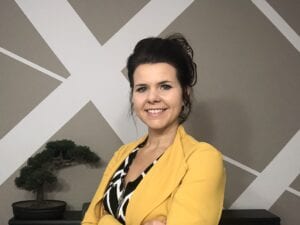
How do you widen your scope as a real estate investor? Going cross-country can definitely scale your business, but it comes with some challenges. In today’s episode, Monick Halm talks to Janie Grenier, the Co-Founder, CEO, and President of Wemindji Properties, Inc. At the age of 19, Janie began investing in real estate, and by the age of 30, she owned well over 100 units of income-producing assets. On today’s show, she talks about the differences between real estate investment rules in her home country of Canada versus in the US. She also discusses the importance of having the right team and accountability partners, and offers some advice for women opting to enter this male-dominated industry.
—
Watch the episode here:
Listen to the podcast here:
Real Estate Investing: The US Market Versus The Canadian Market With Janie Grenier
On this show, we interview incredible badass real estate investor goddesses, women that are crushing it in the real estate investing space. My guest is certainly no exception. I’m super excited to have with me, Janie Grenier. At the age of nineteen, Janie began investing in real estate and by the age of 30, she owned well over 100 units of income-producing assets. She’s a full-time investor. She believes that business growth and success lie in strategic and effective partnerships. She became financially free at the age of 30. She teaches people to be the same. She’s the Cofounder, CEO and President of Wemindji Properties, Inc, J/K’s Real Estate Partners and STR Properties Inc. I am super excited to have her with me. Welcome, Janie.
Thank you so much, Monick. What a pleasure to be here.
It’s a pleasure to have you. You’re a nurse. You’re off to the Arctic to start nursing and to help there. How did you get started in real estate?
Several years ago, I was nineteen but basically, it fell in my lap. I had graduated from nursing school. At that point, I had the commitment from the hospital that we’re committing to give me full-time hours. That’s the only thing I had to buy that first piece of real estate, my first house. That was back in Canada. I am Canadian and I did that in Canada. I had graduated. I got myself my first house. It was almost no money down situation. I got started that way. I did a lot of mistakes. I trusted the wrong people. I lost some money but I learned. I started again. I bought the second property when I was 24 and continuing to work as a nurse.
I don’t know how it is in the US when it comes down to buying conventional with conventional mortgages. In Canada, nursing was one of those things where banks were throwing money at us. It was very easy to get into a property then. My goal was I’ve always loved real estate. I remember when I was a child, I dreamt that I own the Island of Montreal, which is in Quebec and that’s where I’m from originally. I had always been like a natural progression. I’ve always been nerdy in terms of money and investments. I always knew that time and interest was your friend. When all of my friends were going out partying, I was looking to the equivalent of GICs. In Canada, it’s RRSPs. I was looking at all these fun investment vehicles to put your money in and real estate was no different. That’s how I got started. I’ve always wanted to get started in real estate, which I did at an early age. My goal was I wanted to basically buy one house every five years. By the time I was going to say 55, I was going to be able to pay off or sell that first house, buy myself an RV. I love traveling. I was going to live off of the cashflow and do that.
You went a lot faster than that. How did you do that?
Professionally, I am a registered nurse and I do have a specialty in Primary Care especially in remote areas. My specialty is outpost nursing. I work in the Canadian Arctic with our Aboriginal people of Canada. It’s spending a lot of time away from family. The pay is great but I’m away 9, 10 months a year. I quickly realized that I didn’t want to do that for the rest of my life and buying five properties in my lifetime was not going to get me that life that I wanted. As I was getting educated on the real estate topic and surrounding myself by investors, I quickly realized that there was a better way to do it. Since I didn’t want to be a nurse full-time, I pivoted and questioned myself, “If I don’t want to be a nurse full-time, what am I going to do now?” I decided to invest in US real estate.
No matter what background you come from, anybody can do it. Share on XDid you start doing multifamily? How did you scale so big?
In Canada, the cap rates are low. When I did decide to put a lot of time and effort into real estate, we quickly realized that it’s not in Canada that we were going to be able to do that. Prices are high. You have to put down 25% to 35% on a property in Canada when it’s a rental property, and prices are expensive. When we said, “Let’s get started in real estate,” I went to an event here in Canada. It was Canadians, how to invest in US real estate. It blew my mind. The opportunities in the US was incredibly sexy to me compared to what it was in Canada.
There I saw that it was a whole other world. There were so much opportunities in the US and so why not get started there? We looked at different states. We took about a year to look at our options. Where are we going to invest? For us, it’s not our backyard. It didn’t matter if we were investing in Florida, Ohio or wherever. What made sense was, “Is it a landlord-friendly state?” That was one criteria. The other one was, where can we get more bang for our buck and the best returns on investments? Is it a place where there’s a strong rental demand? Those were our criteria. It’s Ohio. That’s where we got started.
Are you in single-families mostly?
We started single-families and then did the BRR model: Buy, Rehab, Renovate. We did that a couple of times. We do small multifamilies and now we do mobile home parks.
Going from Canada to the US, we’ve got a few Canadian goddesses come and share with us. What are some of the things that you have to think about as a Canadian that maybe a US investor might not, like taxes or other things?
For starters, how you buy the real estate and what type of entity. In the US, the LLC is something that most investors use. If we use LLC in Canada, it can be double taxation. That’s a huge problem. There are a lot of real estate companies that come to Canada teaching Canadians how to invest in the US, but the first thing they tell them is to go out and open an LLC, which is the number one problem. If it’s not set up right, it will cause double taxation. That’s a huge problem. The C corp becomes a general partner to limited partnerships and that’s a flow-through entity that’s recognized in Canada, so that’s not a problem.

Real Estate Markets: If you want to do a perfect BRR, you want to get all your money out and must be all in for about 65% of its market value.
The other thing is financing, which could be a big problem if you’re not looking at the right place. There are asset-based lenders out there as you probably know. Some of them do work with foreign nationals, which is great, but often their minimum criteria is a lot higher than for US residents. For instance, on a single-family home, they don’t lend on anything that has a value of less than $100,000. If you’re investing in those lower-income properties, say in Cleveland where we’re at, you can buy a duplex, triplex for $30,000 to $50,000. There’s no way to get your money back out if you wanted to refinance or anything of that sort. That’s something to think about.
That means you’ve had to go to the higher-end homes in order to do it or how are you financing?
We have to be strategic. We had to be in the suburbs of Cleveland where property values were $100,000 and more. The same principles apply. You never want to buy over market value. You still want to buy with that 30%. That’s all the same. For us, it’s even more so because most of our lenders will only finance 65% of its value. If you want to do a perfect BRR, you want to get your money out, all of it, you have to be all in for about 65% of its market value.
You had to find the market that had enough margin in order to make it worthwhile. This is something that a lot of our audiences are going to be wondering about because even if you’re in the US and are investing in a different market like I learned from my mentor, “You live where you want to live. You invest where the numbers make sense.” It’s important to have a very good team on the ground unless you’re living there and doing the work that will help you do it. How did you find your team that’s helping you do this investing?
It’s a lot by trial and error. We spent our weekends in Cleveland, Ohio. We would drive down from Ottawa and spend our weekends there. As much as we could, we’re allowed six months a year in the US under a tourist visa. Although we’re not allowed to work, we are allowed to be in the US for that amount of time as much as we could. We were there building our team and finding property manager, project manager, contractor and to be honest, we hit a lot of walls.
You’ve been in Cleveland and growing mobile home parks now. Let me ask you a question. It’s the question that I ask all of my guests. That’s where you find the gold. What was your biggest mistake and what did you learn from it? We always learn so much more from mistakes than we do when things go right. What was your biggest mistake?
When you start dealing with money, you tend to figure out that there's bad people in the business, too. Share on XThere are quite a few for sure. One of my biggest mistakes, especially in the beginning was taking advice from people who weren’t doing the business or weren’t where I want it to be. That’s people that loved us, family and friends that cared for us, but they impose their self-limiting beliefs on us and the fear of failures. At first, I believe them. Even if I was young when I started investing in the US at 24, 25, it was always their beliefs on us and I stopped and believed them. I would probably be more ahead if I would’ve shrugged them off and believed that I could. You don’t when you’re not sure of yourself.
I definitely learned that family and friends although they love you very much and they care for you, if they’re not doing what you want to do in life, you have to nitpick what’s good and bad. My husband and I secluded ourselves for two years because we knew that this was something that we wanted, but because they discouraged us from doing in the past, we didn’t want that to affect us anymore. We decided to get up, two years, seclude ourselves, learn the business, surround ourselves with people that are doing it and then go from there. I had the conviction that we were able to continue the business and thrive in this space.
Don’t take advice from people who are not doing what you want to do. It doesn’t mean they don’t love you. It’s about if you want to create something, then take advice from people who are doing it. What are you most proud of?
As a woman, it is a space of men. I’m extremely proud that I’m the CEO of all our three companies and very proud that I retired before the age of 30. More importantly, what I’m most proud of is taking control of my life back and living life on my terms. Before that, people were throwing their limits on me and not knowing any better. I was taking it and living the life that I thought was a normal life, but I was not happy in that life. I kept asking myself, “Is this it? There must be more to life than that.” There are many stories out there of people that were not born from a rich family and who made it. Why couldn’t I?
Where do you see yourself going? You’re already in your early 30s. You’ve retired yourself. You’ve created financial freedom. You have over 100 units. What do you see yourself going? What’s your big goal?
In our three companies, the first company is an acquisitions company. That’s where we buy mobile home parks, partners and whatnot. In that company, we’re looking at syndication or crowdfunding. We’ve been exploring that option. We’ve been exploring syndication for a few years, but from the US perspective, what we came across was that since we’re raising capital from Canada, there are other laws in there. We’re looking at the laws and bylaws in Canada, raising capital in Canada to invest in the US is another ballgame that we weren’t thinking about at first. That’s where we’re at for our acquisitions company.

Real Estate Markets: The US is not the best time to invest in short term rentals right now because of COVID.
Our short-term rental management company, we’ve expanded from Canada to the US. With COVID, this might not be the best time to invest in short-term rentals. It’s definitely a great model that we enjoy very much. Our third company, J/K’s Real Estate Partners, that’s an educational company. That’s cool because we’re growing that one a lot. A lot of Canadians are coming to us to ask for training for advice. We decided that we wanted to help as many communities as we could. We’ve been growing that, allowing free trainings and then workshops, coaching one-on-one or group coaching. We’ve been growing that side of the business, which is cool. That’s where we’re at and we’re looking to continue buying, growing and helping as many people as we can.
What do you attribute your success?
My husband, I’ll have to say that it’s the teamwork. He’s the type of person that failure is not an option and I’m more of the spark, the energy, the ideas. Together we create a wonderful team. Our business partnership, the teamwork that we have, that all ties in with our mindsets, our openness. We took action on our goals. We don’t have limiting beliefs and we’ve surrounded ourselves with the right people. We keep growing that network. Above all, we had a burning desire to succeed and to prove to the world that you can do anything that you want to do if you put in the time and the action to accomplish what you want. No matter the background that you come from, anybody can do it.
I also work with my husband. It’s magical when you have that business partner like your love partnership is also your business partnership. What advice do you have for a woman who’s starting out in this field? It’s very male-dominated.
I have three that I thought about. The first one would be that know that you can 100%, any woman can do this business. There are no ifs, ands, or buts. First of all, it would be believing that you can. The second one that I thought about was get yourself an accountability partner, someone that will encourage you and help you on your journey. Whether that person is a friend or a partner, but they have to have the same vision as you. It’s important that that person will have the mindset that failure is not an option. It could be a mentor. It could be a coach. No matter what happens, that person will not tell you to quit when the going gets hard. The third one would be taking the emotions out of the investments that it’s numbers. I learned that at the very beginning.
Sometimes we get excited about a property. It’s like, “This is not the property you’re going to live in.” Don’t think of it like your home. It’s an investment property. It’s a very different criterion. I have one question before we get into our trinity, but what do you wish you’d known at the beginning that you now know?
Teamwork makes the dream work. Share on XI was very naive in the beginning or enthusiastic to think that everybody around is good people. There are no bad people in this world. When you start dealing with money, you tend to figure out that there are bad people in the business too. What I would have liked to know is trust but verify. You need to look at the people that you’re working with and do due diligence properly. Don’t trust everybody with your money because if you don’t have a close enough eye on your pocket, someone else will. Whether that’d be partners, contractors or property managers, not everybody’s good and not everybody has your best interest at heart.
Before we get into the trinity, where can people find out more about you to get in touch?
My website, that would be the easiest choice so that’s www.NowForTomorrow.club or by email [email protected] or again by Facebook. Facebook.com/nowfortomorrowclub.
It’s time for our fame to end of show trinity, which is a brag, a gratitude, and a desire. What’s your brag? What’s one thing you’re celebrating?
When we got started, we knew we wanted to travel the world. When we built our business fund, we did everything that we could to build this business remotely. We could do it either from Canada where we live or from anywhere in the world. That’s number one. Because of that, we have been able to travel 2 to 3 months a year. This was special because my husband and I got married. We took a two-and-a-half-month honeymoon or what we like to call a working moon in Thailand. It was a great time to travel and enjoy living life on our terms.
It’s well bragged both for the lifestyle design, the travel to Thailand, and the wedding. What’s one thing you’re grateful for?

Real Estate Markets: An accountability partner encourages and helps you on your journey.
Teamwork makes the dream work. For sure, my husband and my team. I’m very grateful for them.
Last but not least, what’s one desire?
It all sounds maybe strange, but I’m looking forward to come and live in the US. Getting our investor visas will facilitate our lives. Not having a limit on the amount of time that we’re in the US and also be able to work a little bit as we’re there. Now we can just be there and observe. We can interview a bunch of people, but we can’t do work. Definitely getting our investor visas and we’ve started that process.
So shall your desire be so much better than you can imagine. Thank you. I love our conversations. You can connect with Janie at www.NowForTomorrow.club or at [email protected] or on Facebook @NowForTomorrowClub. You can connect with me at REIGoddesses.com. You can find out about all of our events that are happening mostly virtually because of COVID. We have the awesome summits and things that we’re doing as well. Our investor club where you can find out how you can get on our list of access, passive investing opportunities and join our sisterhood. Please subscribe, comment, show love to the show and share it with your friends. Join us next time for another amazing episode.
Thank you, Monick. Thank you for hosting this show. This is a wonderful sisterhood like you call it. Women need to know that they can do this business.
It’s my pleasure. Thank you.
Important Links:
- Wemindji Properties
- J/K’s Real Estate Partners
- STR Properties Inc.
- www.NowForTomorrow.club
- [email protected]
- Facebook.com/nowfortomorrowclub
About Janie Grenier
 At the age of 19, Janie began investing in real estate and by the age of 30, owned well over 100 units of income producing assets. Now a full-time real estate investor, Janie believes that business growth and success lies in strategic and effective partnerships. Janie became financially free at the young age of 30 and now teaches people how to do the same.
At the age of 19, Janie began investing in real estate and by the age of 30, owned well over 100 units of income producing assets. Now a full-time real estate investor, Janie believes that business growth and success lies in strategic and effective partnerships. Janie became financially free at the young age of 30 and now teaches people how to do the same.
Janie is co-founder, CEO and President of Wemindji Properties, Inc., J/K’s Real Estate Partners, and S.T.R. Properties Inc.
Connect with Moneeka at Blissfulinvestor.com






Death
September 8, 2020 5:32 pmMy developer is trying to persuade me to move to .net from PHP.
I have always disliked the idea because of the
expenses. But he’s tryiong none the less. I’ve been using Movable-type on a number of
websites for about a year and am worried about switching to another platform.
I have heard great things about blogengine.net. Is there a way I can transfer
all my wordpress content into it? Any help would be really appreciated!
Obituary
September 10, 2020 3:13 amMy brother recommended I might like this web site.
He used to be entirely right. This post actually made my day.
You cann’t consider just how much time I had spent for this
information! Thank you!
Caue of Death
October 4, 2020 3:54 amThanks on your marvelous posting! I certainly enjoyed reading it, you could be a great author.
I will make sure to bookmark your blog and will come back in the future.
I want to encourage you to definitely continue your great posts,
have a nice afternoon!
Dead
October 6, 2020 2:03 pmGreate article. Keep posting such kind of information on your site.
Im really impressed by your blog.
Hi there, You have performed an incredible job.
I will definitely digg it and in my view recommend to my friends.
I’m sure they’ll be benefited from this website.